节日由来中英文对照-春节
- 格式:ppt
- 大小:13.38 MB
- 文档页数:46
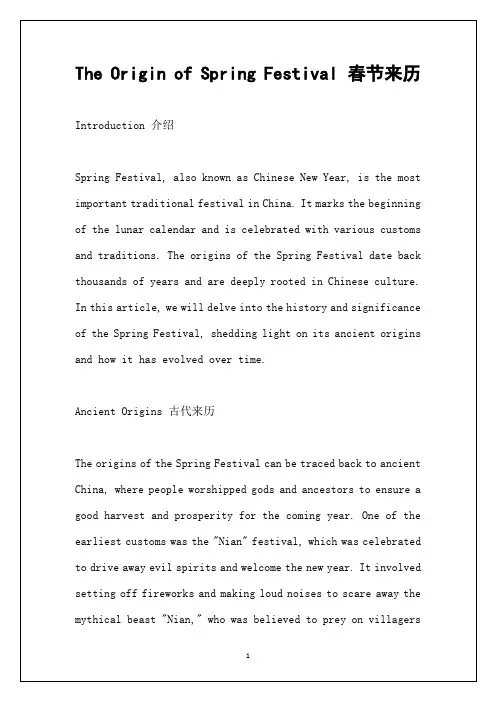
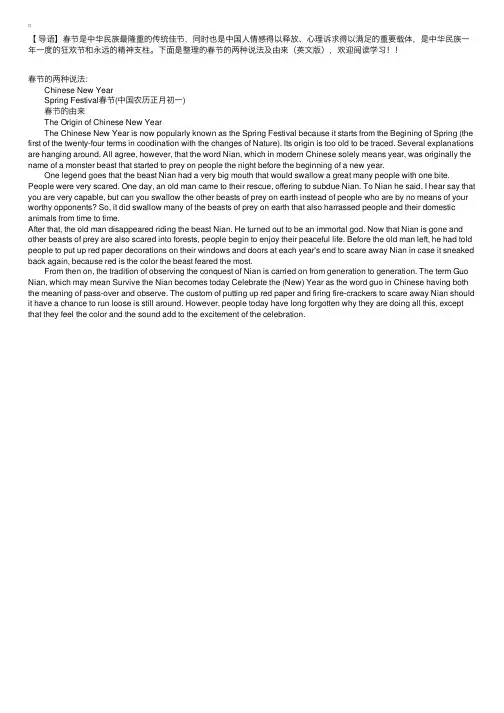
【导语】春节是中华民族最隆重的传统佳节,同时也是中国⼈情感得以释放、⼼理诉求得以满⾜的重要载体,是中华民族⼀年⼀度的狂欢节和永远的精神⽀柱。
下⾯是整理的春节的两种说法及由来(英⽂版),欢迎阅读学习!!春节的两种说法: Chinese New Year Spring Festival春节(中国农历正⽉初⼀) 春节的由来 The Origin of Chinese New Year The Chinese New Year is now popularly known as the Spring Festival because it starts from the Begining of Spring (the first of the twenty-four terms in coodination with the changes of Nature). Its origin is too old to be traced. Several explanations are hanging around. All agree, however, that the word Nian, which in modern Chinese solely means year, was originally the name of a monster beast that started to prey on people the night before the beginning of a new year. One legend goes that the beast Nian had a very big mouth that would swallow a great many people with one bite. People were very scared. One day, an old man came to their rescue, offering to subdue Nian. To Nian he said, I hear say that you are very capable, but can you swallow the other beasts of prey on earth instead of people who are by no means of your worthy opponents? So, it did swallow many of the beasts of prey on earth that also harrassed people and their domestic animals from time to time.After that, the old man disappeared riding the beast Nian. He turned out to be an immortal god. Now that Nian is gone and other beasts of prey are also scared into forests, people begin to enjoy their peaceful life. Before the old man left, he had told people to put up red paper decorations on their windows and doors at each year's end to scare away Nian in case it sneaked back again, because red is the color the beast feared the most. From then on, the tradition of observing the conquest of Nian is carried on from generation to generation. The term Guo Nian, which may mean Survive the Nian becomes today Celebrate the (New) Year as the word guo in Chinese having both the meaning of pass-over and observe. The custom of putting up red paper and firing fire-crackers to scare away Nian should it have a chance to run loose is still around. However, people today have long forgotten why they are doing all this, except that they feel the color and the sound add to the excitement of the celebration.。
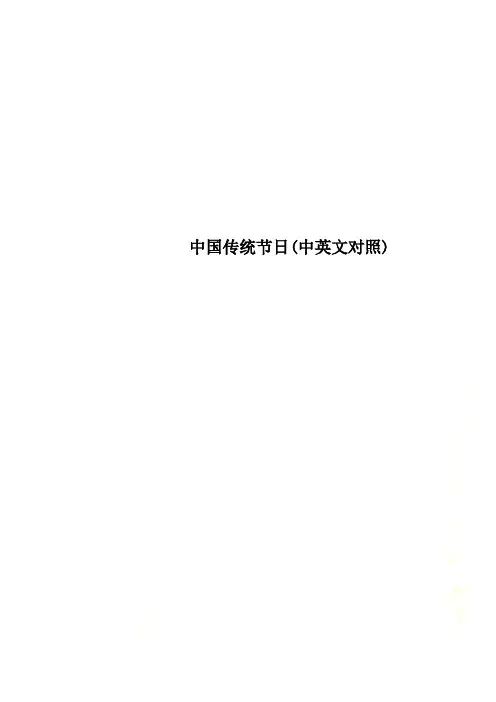
中国传统节日(中英文对照)中国传统节日(中英文对照简介)目录The Spring Festival(春节)Lantern Festival(元宵节)Qingming Festival(清明节)Dragon Boat Festival(端午节)Double Seventh Festival(七夕)Mid-Autumn Festival(中秋节)Double Ninth Festival(重阳节)Winter Solstice Festival(冬至)together to have dinner while watching TV programs.For Chinese at home and abroad, the Spring Festival is always the most important festival.农历的正(zheng)月初一,是中国的农历新年。
在中国的传统节日中,这是一个最重要、最热闹的节日。
因为过农历新年的时候,正是冬末春初,所以人们也把这个节日叫“春节”。
中国人过春节有很多传统习俗。
从腊月二十三起,人们就开始准备过年了。
在这段时间里,家家户户要大扫除,买年货,贴窗花,挂年画,写春联,蒸年糕,做好各种食品,准备辞旧迎新。
春节的前夜叫“除夕”。
除夕之夜,是家人团聚的时候。
一家人围坐在一起,吃一顿丰盛的年夜饭,说说笑笑,直到天亮,这叫守岁。
除夕零点的钟声一响,人们还要吃饺子。
古时候叫零点为“子时”,除夕的子时正是新旧年交替的时候,人们在这时吃饺子,是取“更岁交子”的意思。
这也是“饺子”名称的由来。
过了除夕就是大年初一。
从初一开始,人们要走亲戚、看朋友,互相拜年。
拜年,是春节的重要习俗。
拜年时,大家都要说一些祝愿幸福、健康的吉祥话。
放爆竹是春节期间孩子们最喜欢的活动。
传说燃放爆竹可以驱妖除魔,所以每年从除夕之夜起,到处就响起了接连不断的爆竹声。
阵阵烟花,声声爆竹,给节日增添了喜庆的气氛。
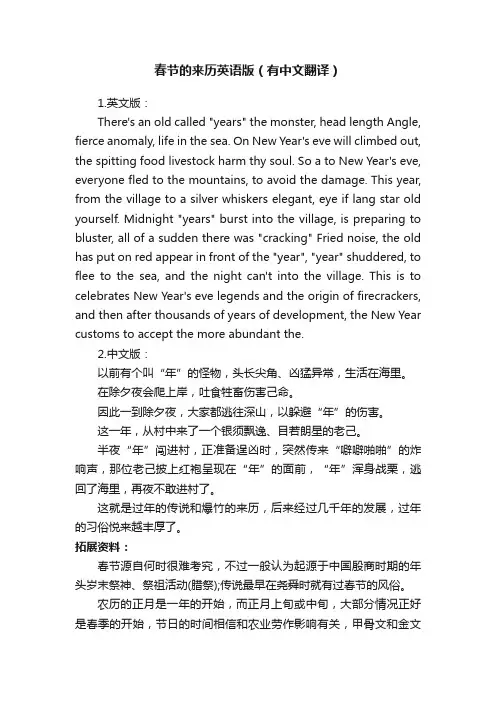
春节的来历英语版(有中文翻译)1.英文版:There's an old called "years" the monster, head length Angle, fierce anomaly, life in the sea. On New Year's eve will climbed out, the spitting food livestock harm thy soul. So a to New Year's eve, everyone fled to the mountains, to avoid the damage. This year, from the village to a silver whiskers elegant, eye if lang star old yourself. Midnight "years" burst into the village, is preparing to bluster, all of a sudden there was "cracking" Fried noise, the old has put on red appear in front of the "year", "year" shuddered, to flee to the sea, and the night can't into the village. This is to celebrates New Year's eve legends and the origin of firecrackers, and then after thousands of years of development, the New Year customs to accept the more abundant the.2.中文版:以前有个叫“年”的怪物,头长尖角、凶猛异常,生活在海里。
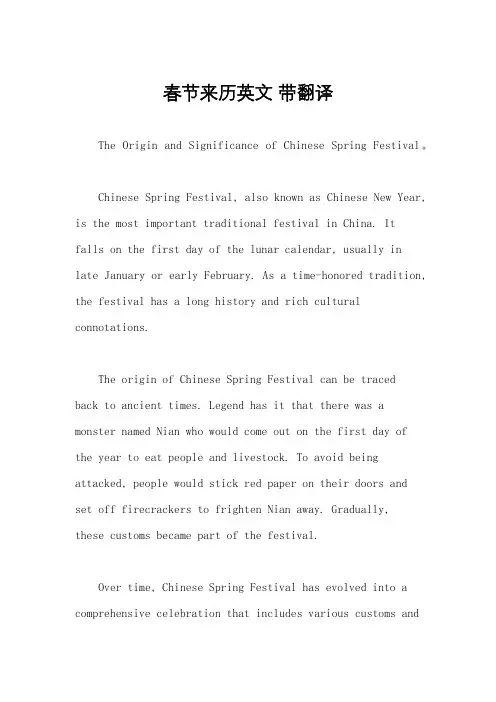
春节来历英文带翻译The Origin and Significance of Chinese Spring Festival。
Chinese Spring Festival, also known as Chinese New Year, is the most important traditional festival in China. Itfalls on the first day of the lunar calendar, usually inlate January or early February. As a time-honored tradition, the festival has a long history and rich cultural connotations.The origin of Chinese Spring Festival can be tracedback to ancient times. Legend has it that there was a monster named Nian who would come out on the first day ofthe year to eat people and livestock. To avoid being attacked, people would stick red paper on their doors andset off firecrackers to frighten Nian away. Gradually,these customs became part of the festival.Over time, Chinese Spring Festival has evolved into a comprehensive celebration that includes various customs andactivities. One of the most important customs is thereunion dinner, which is held on the eve of the festival. Families gather together to enjoy a feast and exchange greetings. Another popular custom is the red envelope,which is filled with money and given to children as a New Year's gift. Additionally, people decorate their homes with red lanterns, couplets, and other auspicious symbols tobring good luck and happiness.Chinese Spring Festival not only has cultural significance, but also has economic and social implications. It is a time when people take a break from work and spend time with their families. It is also a time when people travel back to their hometowns to reunite with their loved ones. As a result, the festival has a huge impact on transportation, tourism, and consumption.In recent years, Chinese Spring Festival has alsogained international attention. Many countries around the world have held various celebrations to mark the occasion, such as parades, dragon dances, and fireworks displays.This demonstrates the growing influence of Chinese cultureand the increasing interest in China among people from different countries.In conclusion, Chinese Spring Festival is a time-honored tradition that reflects the rich cultural heritage of China. It is a time for family reunions, cultural exchange, and joyful celebrations. As China continues to develop and play a more prominent role in the world, Chinese Spring Festival will undoubtedly become a more important cultural event on the global stage.。
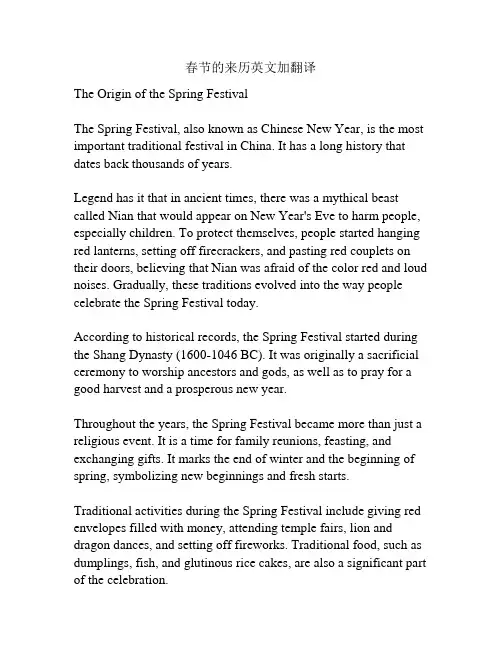
春节的来历英文加翻译The Origin of the Spring FestivalThe Spring Festival, also known as Chinese New Year, is the most important traditional festival in China. It has a long history that dates back thousands of years.Legend has it that in ancient times, there was a mythical beast called Nian that would appear on New Year's Eve to harm people, especially children. To protect themselves, people started hanging red lanterns, setting off firecrackers, and pasting red couplets on their doors, believing that Nian was afraid of the color red and loud noises. Gradually, these traditions evolved into the way people celebrate the Spring Festival today.According to historical records, the Spring Festival started during the Shang Dynasty (1600-1046 BC). It was originally a sacrificial ceremony to worship ancestors and gods, as well as to pray for a good harvest and a prosperous new year.Throughout the years, the Spring Festival became more than just a religious event. It is a time for family reunions, feasting, and exchanging gifts. It marks the end of winter and the beginning of spring, symbolizing new beginnings and fresh starts.Traditional activities during the Spring Festival include giving red envelopes filled with money, attending temple fairs, lion and dragon dances, and setting off fireworks. Traditional food, such as dumplings, fish, and glutinous rice cakes, are also a significant part of the celebration.In modern times, the Spring Festival has become a national holiday in China and is celebrated by Chinese communities all over the world. It is a time for people to express their best wishes, visit relatives and friends, and embrace the spirit of joy and renewal.春节的来历春节,也被称为中国新年,是中国最重要的传统节日。
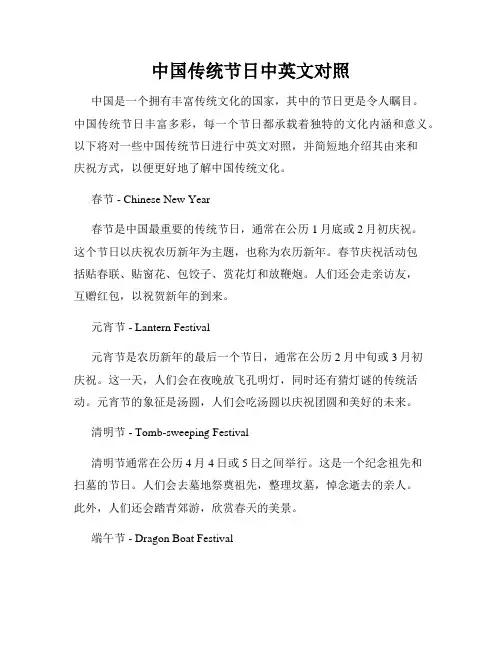
中国传统节日中英文对照中国是一个拥有丰富传统文化的国家,其中的节日更是令人瞩目。
中国传统节日丰富多彩,每一个节日都承载着独特的文化内涵和意义。
以下将对一些中国传统节日进行中英文对照,并简短地介绍其由来和庆祝方式,以便更好地了解中国传统文化。
春节 - Chinese New Year春节是中国最重要的传统节日,通常在公历1月底或2月初庆祝。
这个节日以庆祝农历新年为主题,也称为农历新年。
春节庆祝活动包括贴春联、贴窗花、包饺子、赏花灯和放鞭炮。
人们还会走亲访友,互赠红包,以祝贺新年的到来。
元宵节 - Lantern Festival元宵节是农历新年的最后一个节日,通常在公历2月中旬或3月初庆祝。
这一天,人们会在夜晚放飞孔明灯,同时还有猜灯谜的传统活动。
元宵节的象征是汤圆,人们会吃汤圆以庆祝团圆和美好的未来。
清明节 - Tomb-sweeping Festival清明节通常在公历4月4日或5日之间举行。
这是一个纪念祖先和扫墓的节日。
人们会去墓地祭奠祖先,整理坟墓,悼念逝去的亲人。
此外,人们还会踏青郊游,欣赏春天的美景。
端午节 - Dragon Boat Festival端午节是一个具有悠久历史的节日,通常在公历6月初庆祝。
这个节日源于纪念古代爱国诗人屈原,也是一项庆祝夏天到来的活动。
人们会参加龙舟赛、包粽子和挂艾草。
象征食物是粽子,人们吃粽子以保护自己免受邪恶和疾病的侵袭。
中秋节 - Mid-Autumn Festival中秋节是农历八月十五,通常在公历9月底或10月初庆祝。
这个节日庆祝秋天的丰收和团圆。
人们会赏月、品尝月饼以及举办家庭聚会。
月饼是中秋节的特色食物,馅料的种类多样,寓意着团圆和祝福。
重阳节 - Double Ninth Festival重阳节通常在公历9月初或10月底庆祝,也被称为老人节。
此节日的由来与古代传说有关,人们会爬山、采菊、追溯阳光,并祝福年长的亲人和朋友。
重阳节也是缅怀祖先和尊重老年人的时间。
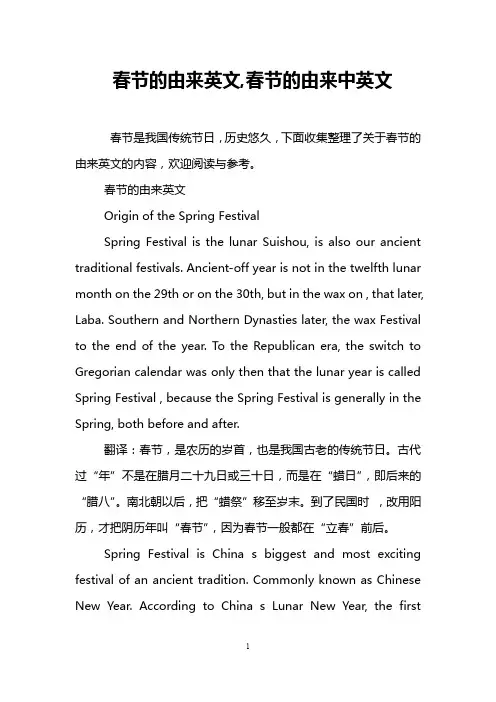
春节的由来英文,春节的由来中英文春节是我国传统节日,历史悠久,下面收集整理了关于春节的由来英文的内容,欢迎阅读与参考。
春节的由来英文Origin of the Spring FestivalSpring Festival is the lunar Suishou, is also our ancient traditional festivals. Ancient-off year is not in the twelfth lunar month on the 29th or on the 30th, but in the wax on , that later, Laba. Southern and Northern Dynasties later, the wax Festival to the end of the year. To the Republican era, the switch to Gregorian calendar was only then that the lunar year is called Spring Festival , because the Spring Festival is generally in the Spring, both before and after.翻译:春节,是农历的岁首,也是我国古老的传统节日。
古代过“年”不是在腊月二十九日或三十日,而是在“蜡日”,即后来的“腊八”。
南北朝以后,把“蜡祭”移至岁末。
到了民国时,改用阳历,才把阴历年叫“春节”,因为春节一般都在“立春”前后。
Spring Festival is China s biggest and most exciting festival of an ancient tradition. Commonly known as Chinese New Year. According to China s Lunar New Year, the firstmonth who started in ancient times known Mongol Yuan Chen, Yuan-cheng, Yuan Shuo, New Year s Day and so on, commonly known as New Year s Day, as well as the previous day, moving in, three new moon, three North Korea, the three began, ternary, etc. Do not say, which means the first month who started this is the year, month, day three start.翻译:春节是我国最盛大、最热闹的一个古老传统节日。
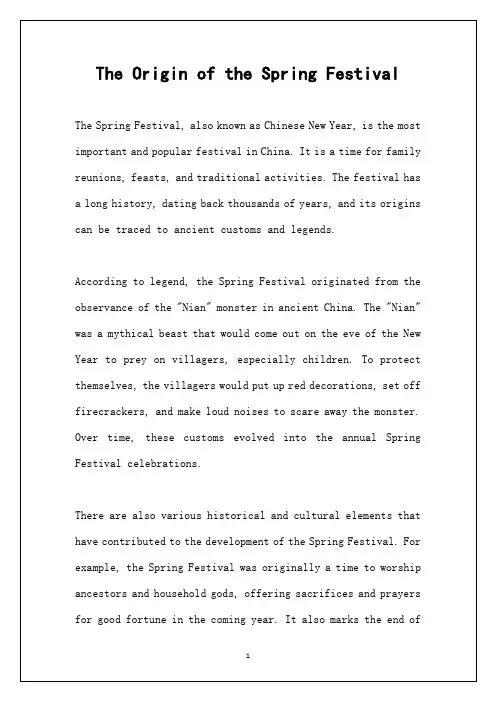
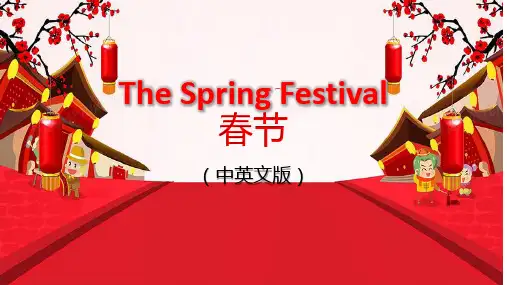
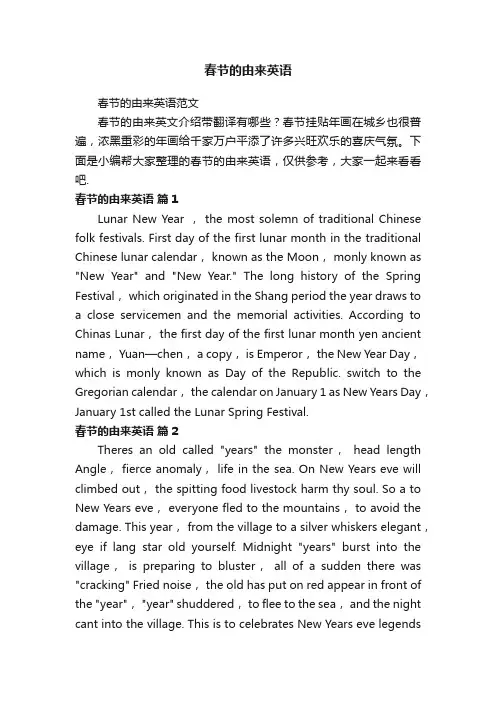
春节的由来英语春节的由来英语范文春节的由来英文介绍带翻译有哪些?春节挂贴年画在城乡也很普遍,浓黑重彩的年画给千家万户平添了许多兴旺欢乐的喜庆气氛。
下面是小编帮大家整理的春节的由来英语,仅供参考,大家一起来看看吧.春节的由来英语篇1Lunar New Year , the most solemn of traditional Chinese folk festivals. First day of the first lunar month in the traditional Chinese lunar calendar, known as the Moon, monly known as "New Year" and "New Year." The long history of the Spring Festival, which originated in the Shang period the year draws to a close servicemen and the memorial activities. According to Chinas Lunar, the first day of the first lunar month yen ancient name, Yuan—chen, a copy, is Emperor, the New Year Day,which is monly known as Day of the Republic. switch to the Gregorian calendar, the calendar on January 1 as New Years Day,January 1st called the Lunar Spring Festival.春节的由来英语篇2Theres an old called "years" the monster,head length Angle, fierce anomaly, life in the sea. On New Years eve will climbed out, the spitting food livestock harm thy soul. So a to New Years eve, everyone fled to the mountains, to avoid the damage. This year, from the village to a silver whiskers elegant,eye if lang star old yourself. Midnight "years" burst into the village,is preparing to bluster,all of a sudden there was "cracking" Fried noise, the old has put on red appear in front of the "year", "year" shuddered, to flee to the sea, and the night cant into the village. This is to celebrates New Years eve legendsand the origin of firecrackers, and then after thousands of years of development, the Chinese New Year customs to accept the more abundant the.春节的由来英语篇3There are a lot of valid, rich and colorful legends about the origin of the Lunar New Year. They can be traced to thousands of years ago, among which the most famous one is the legend of Monster Nian. Monster Nian was a cruel wild animal. Ancient people believed that Monster Nian would e out to eat people on New Year’s Eve. It was said that Monster Nian was afraid of red,fire and noise. In order to repel it, people would put the red notes on doors and keep the torch alight all night as well as set off firecrackers. Early next morning, people greeted each other. The air was filled with the victory and the rebirth joy.春节的由来英语篇4The Chinese New Year is now popularly known as the Spring Festival because it starts from the Begining of Spring (the first of the twenty—four terms in coodination with the changes of Nature). Its origin is too old to be traced. Several explanations are hanging around. All agree, however, that the word Nian,which in modern Chinese solely means year, was originally the name of a monster beast that started to prey on people the night before the beginning of a new year.One legend goes that the beast Nian had a very big mouth that would swallow a great many people with one bite. People were very scared. One day, an old man came to their rescue,offering to subdue Nian. To Nian he said, I hear say that you are very capable, but can you swallow the other beasts of prey on earth instead of people who are by no means of your worthy opponents? So, it did swallow many of the beasts of prey onearth that also harrassed people and their domestic animals from time to time.After that, the old man disappeared riding the beast Nian. He turned out to be an immortal god. Now that Nian is gone and other beasts of prey are also scared into forests, people begin to enjoy their peaceful life. Before the old man left, he had told people to put up red paper decorations on their windows and doors at each years end to scare away Nian in case it sneaked back again, because red is the color the beast feared the most.。
春节的由来英语作文,四年级(中英文版)**English Composition: The Origin of the Spring Festival**The Spring Festival, also known as Chinese New Year, is the most important traditional holiday in China.It is celebrated at the beginning of the lunar year and is rich in cultural significance and customs.The origin of the Spring Festival can be traced back to the Shang Dynasty over 3,500 years ago.It began as a festival to honor ancestors and deities and to pray for a good harvest in the coming year.Over time, it has evolved into a celebration of family reunions, happiness, and the hope for a bright future.According to legend, the festival was first established to ward off a beast called "Nian," which would terrorize villages and devour crops and livestock.To scare away "Nian," people would put up red decorations, set off firecrackers, and perform lion and dragon dances.These traditions are still practiced today as a way to celebrate the New Year and chase away bad luck.During the Spring Festival, families come together to enjoy a feast on New Year"s Eve, exchange red envelopes filled with money, and watch the famous Spring Festival Gala on TV.The festival also involves cleaning the house to sweep away bad luck and make room for incoming good fortune, as well as wearing new clothes to symbolize a fresh start.The Spring Festival is not only a time for celebration but also a time for reflection and renewal.It is a chance to honor the past, enjoy the present, and look forward to the future.**中文作文:春节的由来**春节,又称中国新年,是中国最重要的传统节日。
春节的由来英文,春节的由来中英文春节是我国传统节日,历史悠久,下面收集整理了关于春节的由来英文的内容,欢迎阅读与参考。
春节的由来英文Origin of the Spring FestivalSpring Festival is the lunar Suishou, is also our ancient traditi onal festivals. An cie nt-off year is not in the twelfth lunar mon th on the 29th or on the 30th, but in the wax on , that later, Laba. Souther n and Norther n Dyn asties later, the wax Festival to the end of the year. To the Republican era, the switch to Gregoria n cale ndar was only the n that the lunar year is called Spring Festival , because the Spring Festival is gen erally in the Spring, both before and after.翻译:春节,是农历的岁首,也是我国古老的传统节日。
古代过“年”不是在腊月二十九日或三十日,而是在“蜡日”,即后来的“腊八”。
南北朝以后,把“蜡祭”移至岁末。
到了民国时,改用阳历,才把阴历年叫“春节”,因为春节一般都在“立春”前后。
Spring Festival is China s biggest and most exciting festival of an an cie nt traditi on. Commonly known as Chin ese New Year. Accordingto China s Lunar New Year, the first month who started in an cie nt times known Mon gol Yuan Chen, Yuan-che ng,Yuan Shuo, New Year s Day and so on, com monly known as New Year s Day, as well as the previous day, moving in, three new moon, three North Korea, the three began, ternary, etc. Do not say, which means the first mon th who started this is the year, mon th, day three start.翻译:春节是我国最盛大、最热闹的一个古老传统节日。
春节的两种说法及由来(英文版)春节的两种说法:Chinese New YearSpring Festival春节(中国农历正月初一)春节的由来The Origin of Chinese New YearThe Chinese New Year is now popularly known as the Spring Festival because it starts from the Begining of Spring (the first of the twenty-four terms in coodination with thechanges of Nature). Its origin is too old to be traced. Several explanations are hanging around. All agree, however, that the word Nian, which in modern Chinese solely means year, was originally the name of a monster beast that started toprey on people the night before the beginning of a new year.One legend goes that the beast Nian had a very big mouth that would swallow a great many people with one bite. People were very scared. One day, an old man came to their rescue, offering to subdue Nian. To Nian he said, I hear say that you are very capable, but can you swallow the other beasts ofprey on earth instead of people who are by no means of your worthy opponents? So, it did swallow many of the beasts ofprey on earth that also harrassed people and their domestic animals from time to time.After that, the old man disappeared riding the beast Nian. He turned out to be an immortal god. Now that Nian is gone andother beasts of prey are also scared into forests, people begin to enjoy their peaceful life. Before the old man left, he had told people to put up red paper decorations on their windows and doors at each year's end to scare away Nian in case it sneaked back again, because red is the color the beast feared the most.From then on, the tradition of observing the conquest of Nian is carried on from generation to generation. The term Guo Nian, which may mean Survive the Nian becomes today Celebrate the (New) Year as the word guo in Chinese having both the meaning of pass-over and observe. The custom of putting up red paper and firing fire-crackers to scare away Nian should it have a chance to run loose is still around. However, people today have long forgotten why they are doing all this, except that they feel the color and the sound add to the excitement of the celebration.。
元旦New YearIt falls on the first day of the year. It marks the beginning of a year. People will plan what to do in the New Year. Because they believe that the whole year's work depends on a good start in spring.春节Spring FestivalSpring Festival is the most important festival in China. It is on the first day of the first lunar month(阴历正月). On the eve of the festival, people will paste spring poems(贴春联)with lucky words. They prepare delicious food, dumpling is a must. They also clean their house, but there is no sweeping on spring festival for people think it will sweep away good luck. People often come back home to enjoy family reunion, the whole family will get together for the big dinner. They also exchange greeting with other friends and relatives.元宵Lantern FestivalIt comes on the 15th of the first lunar month and it marks the end of the Spring Festival. On this day, people often eat sweet dumplings(元宵)for good luck. They will visit the display of lanterns(灯展)or go for temple fair(庙会)清明QingmingQingming —It is also called Tomb-Sweeping Day. It falls on April 4th or 5th. That is a special day for the living to show love and respect to their dead friends or relatives. People often go to sweep the tomb and put themeat, wine in front of the tomb. One interesting thing is that people burn the paper money for the dead.端午Dragon Boat FestivalThis day is on the fifth of the fifth lunar month, People often get together to watch the wonderful “Dragon Boat Race”(龙舟大赛),Rice dumpling is a must on Dragon Boat Festival.中秋Mid-autumn DayIt comes on the 15th of the eighth lunar month. People often gaze at the “Lady in the moon”(嫦娥) and eat moon cakes.腊月二十三——小年December 23 of the Lunar Calendar (Little New Year) Custom: Worshiping the Kitchen GodAs the legend goes, there is a kitchen god in each house who is responsible for the kitchen and oversees the conduct of the family. On this day, the kitchen god returns to Heaven to report the conducts of the family to the Emperor of Heaven. Therefore, worshipping the kitchen god aims to “please him.” People put out some sweet and sticky foods, such as rice dumplings and malted sugar. In this way, the lips of the kitchen god will stuck together, and he cannot report any wrong doings of the family. Thus the family can lead an auspicious life.习俗:祭灶民俗传说中,每家都有一位灶神掌管饮食,也记录一家人的言行。